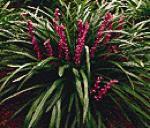Search engine visitors - click here to access entire "$ensible Home" web site
Click here to see a descriptive illustration showing several types of ground cover.
Dear Jim: I am trying to decide between using decorative gravel or ground cover plants near my house. I know the gravel gets hot in the sun, but the plants will make the air more humid. Which is the best to use? - Joe R.

A: Gravel or stone that is exposed to the hot afternoon sun can become a heat island. This hot area can reradiate the heat up through your walls and into your windows. Also, since gravel has a high thermal mass capacity and is heavy, it stays hot long after the sun goes down at night.
Decorative gravel can be an attractive accent, but limit its use to areas that receive shade from deciduous trees. During the winter, when trees lose their leaves, the free solar heat stored in the gravel will be welcomed.
Low-growing ground cover in sunny locations adjacent to the house is a good choice for most climates. This is particularly true if you air-condition your home. If your windows and doors are properly weatherstripped, the higher humidity air above the plants will not get inside your home.
Plants, even small ones close to the ground, act as mini-air conditioners. The air temperature near them is often at least 10 degrees cooler than the ambient air temperature. This lower air temperature near your house means that less heat energy will transfer indoors through walls and windows.
The process by which plants cool air is called transpiration. The leaves of the plants evaporate large quantities of water into the surrounding air. This is a similar cooling effect to when we perspire. When liquid water changes states to water vapor, its consumes energy and thus becomes cooler.
If you don't air-condition and rely on natural ventilation through windows, plant very low ground cover that is drought resistant. This is especially true for humid climates. Drought-resistance plants will give off less humidity and they will not absorb and hold the sun's heat as gravel does.
Where you have a concrete walkway or driveway near the house that cannot be shaded, plant some medium-height deciduous shrubs. These will block the direct radiant heat path from the hot walkway or driveway to your house.
When selecting your plants, consider the plants' height, spread, texture, foliage and whether they are deciduous or evergreen. A variety of plants with complementary and contrasting colors can create a stunning appearance. Try to select ones that have similar watering requirements.
Use mulch liberally around your plants near your house. Mulch creates contrast with the plant's green foliage and slows water evaporation from the soil. This is good for the plants and for the cooling process.
Instant Download Update Bulletin No. 793 - list of 55 ground cover plants, types (perennial, deciduous, evergreen), hardiness zones and U.S. map, height, spacing, preferred soil, propagation methods (division, cuttings, seeds), chart to estimate number of plants required for specific are in square feet and a mulch selector guide.
Dear Jim: We seem to get a lot of highway noise through our windows. They are double-pane ones. The noise seems to be worse during the summer. Will installing heavy drapes help to reduce the road noise? - Vickie D.
A: The noise transmission through your windows should not be a lot different between summer and winter. It is probably more annoying during the summer because, with longer daylight hours, there is more driving later at night.
Caulking your existing window and front door frames will help the most and it is an inexpensive project. Installing heavy drapes, after you caulk, will block additional noise and increase overall insulation.